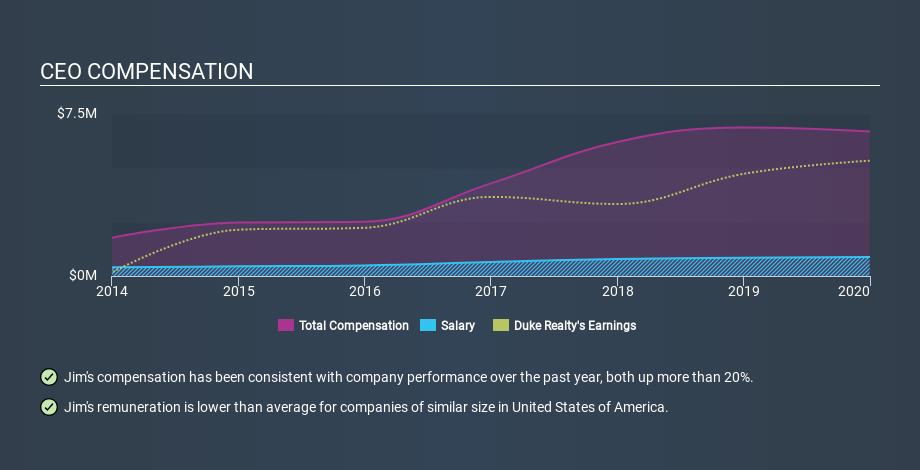Should You Be Pleased About The CEO Pay At Duke Realty Corporation's (NYSE:DRE)

Jim Connor has been the CEO of Duke Realty Corporation (NYSE:DRE) since 2016. This report will, first, examine the CEO compensation levels in comparison to CEO compensation at other big companies. Next, we'll consider growth that the business demonstrates. Third, we'll reflect on the total return to shareholders over three years, as a second measure of business performance. This method should give us information to assess how appropriately the company pays the CEO.
View our latest analysis for Duke Realty
How Does Jim Connor's Compensation Compare With Similar Sized Companies?
Our data indicates that Duke Realty Corporation is worth US$11b, and total annual CEO compensation was reported as US$6.7m for the year to December 2019. That's actually a decrease on the year before. While we always look at total compensation first, we note that the salary component is less, at US$878k. We further remind readers that the CEO may face performance requirements to receive the non-salary part of the total compensation. We looked at a group of companies with market capitalizations over US$8.0b and the median CEO total compensation was US$12m. Once you start looking at very large companies, you need to take a broader range, because there simply aren't that many of them.
This would give shareholders a good impression of the company, since most large companies pay more, leaving less for shareholders. While this is a good thing, you'll need to understand the business better before you can form an opinion.
The graphic below shows how CEO compensation at Duke Realty has changed from year to year.
Is Duke Realty Corporation Growing?
On average over the last three years, Duke Realty Corporation has grown earnings per share (EPS) by 9.4% each year (using a line of best fit). It achieved revenue growth of 3.0% over the last year.
I'd prefer higher revenue growth, but the modest improvement in EPS is good. So there are some positives here, but not enough to earn high praise. You might want to check this free visual report on analyst forecasts for future earnings.
Has Duke Realty Corporation Been A Good Investment?
Duke Realty Corporation has served shareholders reasonably well, with a total return of 20% over three years. But they would probably prefer not to see CEO compensation far in excess of the median.
In Summary...
It looks like Duke Realty Corporation pays its CEO less than the average at large companies.
It's well worth noting that while Jim Connor is paid less than most company leaders (at large companies, share price performance has been somewhat uninspiring. But on this analysis I see no issue with the CEO compensation. Shifting gears from CEO pay for a second, we've spotted 3 warning signs for Duke Realty you should be aware of, and 1 of them is significant.
Arguably, business quality is much more important than CEO compensation levels. So check out this free list of interesting companies, that have HIGH return on equity and low debt.
If you spot an error that warrants correction, please contact the editor at editorial-team@simplywallst.com. This article by Simply Wall St is general in nature. It does not constitute a recommendation to buy or sell any stock, and does not take account of your objectives, or your financial situation. Simply Wall St has no position in the stocks mentioned.
We aim to bring you long-term focused research analysis driven by fundamental data. Note that our analysis may not factor in the latest price-sensitive company announcements or qualitative material. Thank you for reading.

 Yahoo Finance
Yahoo Finance 
